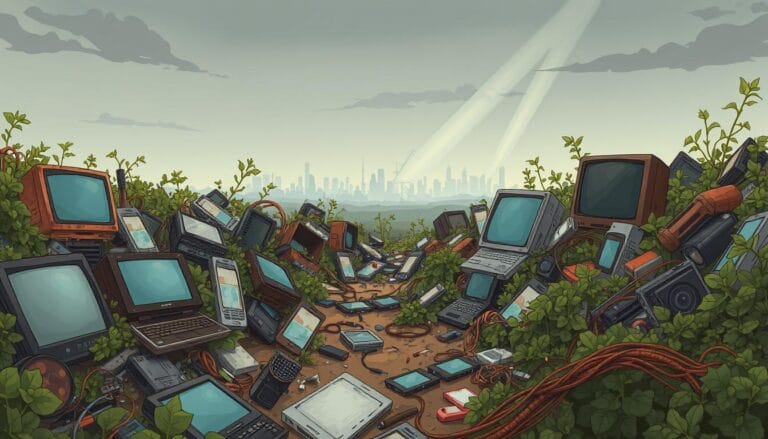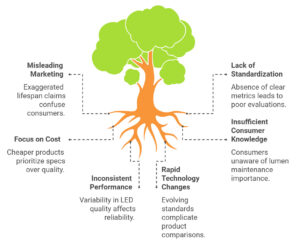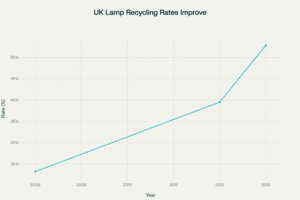Did you know the UK produces 1.6 million tonnes of e-waste each year? That’s as heavy as over 130,000 double-decker buses. This staggering figure underlines the problem with e-waste and the critical need for better electronic waste management.
Our discarded electronics are accumulating at an alarming rate. Only 20% of e-waste is recycled correctly, causing significant environmental harm. Our fast-paced culture and quick technological updates have created a dire situation.
In this article, we’ll examine the problem with e-waste , the challenges, its environmental consequences, and possible solutions.
Understanding E-waste: Definition and Scope
E-waste is a growing problem in today’s tech-driven world. As we look at how to manage all this discarded electronics, it’s crucial to grasp what e-waste really is and the impact it’s having across the globe. It doesn’t help there’s a new iPhone release every few months.
What constitutes electronic waste?
E-waste, or electronic waste, includes everything from old phones and laptops to broken lighting and appliances we toss out when they’re no longer useful. With tech advancing so quickly, the amount of e-waste is piling up fast, creating serious problems for our environment if it’s not handled right. It’s more important than ever to understand what e-waste is and why it matters.
The global scale of e-waste generation
The volume of e-waste produced worldwide is staggering. In 2022, an estimated 62 million tonnes of e-waste were generated globally. Sadly, only 22.3% was formally collected and recycled. This highlights the urgent need for better e-waste recycling practices.
| Year | Global E-waste Generated (million tonnes) | Formally Recycled (%) |
|---|---|---|
| 2022 | 62 | 22.3 |
| 2019 | 53.6 | 17.4 |
| 2016 | 44.7 | 20 |
E-waste as a rapidly growing waste stream
E-waste is one of the fastest-growing waste streams globally. In the UK, the average household owns approximately 25 electronic devices. This contributes significantly to the mounting e-waste challenge. The rapid growth highlights the need for sustainable electronics and effective e-waste management strategies.
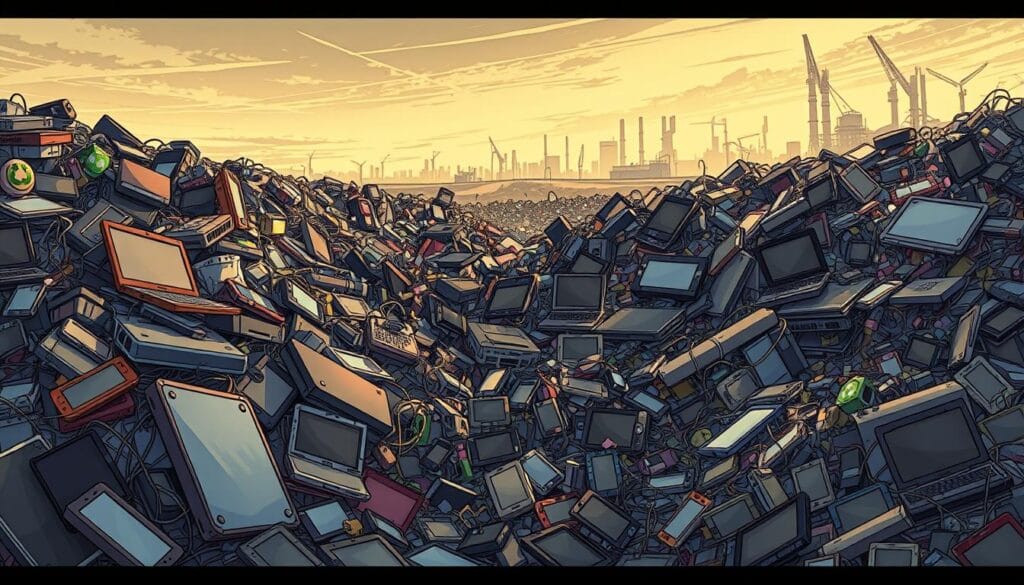
As we continue to rely more heavily on technology, addressing the e-waste crisis becomes increasingly critical. It’s time we all play our part in responsible consumption and disposal of electronic devices.
The Environmental Impact of E-waste
E-waste poses significant environmental risks due to its complex composition and improper disposal methods. The environmental effects of e-waste are far-reaching, affecting our ecosystems and contributing to global climate change.
Toxic Substances in Electronic Devices
Electronic devices contain a myriad of hazardous materials. These include heavy metals like lead, mercury, and cadmium, as well as flame retardants and other toxic chemicals. When e-waste is improperly disposed of, these substances can leach into the environment, causing severe damage.
Contamination of Soil, Water, and Air
The environmental impact of e-waste is most evident in the contamination of our natural resources. When electronic waste ends up in landfills or is incinerated, toxic substances can seep into soil and water systems. This pollution affects plant life, aquatic ecosystems, and ultimately, human health.
Contribution to Greenhouse Gas Emissions
E-waste management practices contribute to greenhouse gas emissions. Improper recycling techniques and incineration release harmful gases into the atmosphere. In contrast, proper recycling of e-waste in the UK can significantly reduce carbon emissions.
| E-waste Component | Environmental Impact |
|---|---|
| Lead | Soil and water contamination, harmful to plants and animals |
| Mercury | Air and water pollution, bioaccumulation in food chains |
| Flame Retardants | Persistent organic pollutants, affecting air quality |
We must address the growing e-waste crisis to mitigate its severe environmental effects. Proper disposal and recycling practices are essential in reducing the environmental impact of our electronic consumption habits.
Health Risks Associated with E-waste Exposure
As our dependence on electronic devices escalates, the health risks from e-waste become more evident. Informal recycling of e-waste poses significant dangers, mainly to children and pregnant women. These groups are more susceptible to the harmful effects.
Studies have uncovered severe health consequences from e-waste exposure. These include:
- Adverse neonatal outcomes
- Neurodevelopmental problems
- Reduced lung function
- Increased risk of injury
Children involved in waste picking and manual dismantling face direct exposure to harmful substances. The environmental impacts of e-waste extend beyond immediate health risks, potentially affecting future generations.
A recent UK study revealed disturbing statistics:
| Age Group | Percentage Affected | Common Health Issues |
|---|---|---|
| Children (0-14) | 15% | Respiratory problems, developmental delays |
| Adolescents (15-19) | 12% | Skin irritations, cognitive impairments |
| Adults (20-64) | 8% | Reproductive issues, chronic diseases |
It is imperative to focus on safe e-waste management practices. This includes adopting proper disposal methods and establishing better recycling infrastructure. Such measures are essential to reduce the environmental and health impacts of electronic waste.
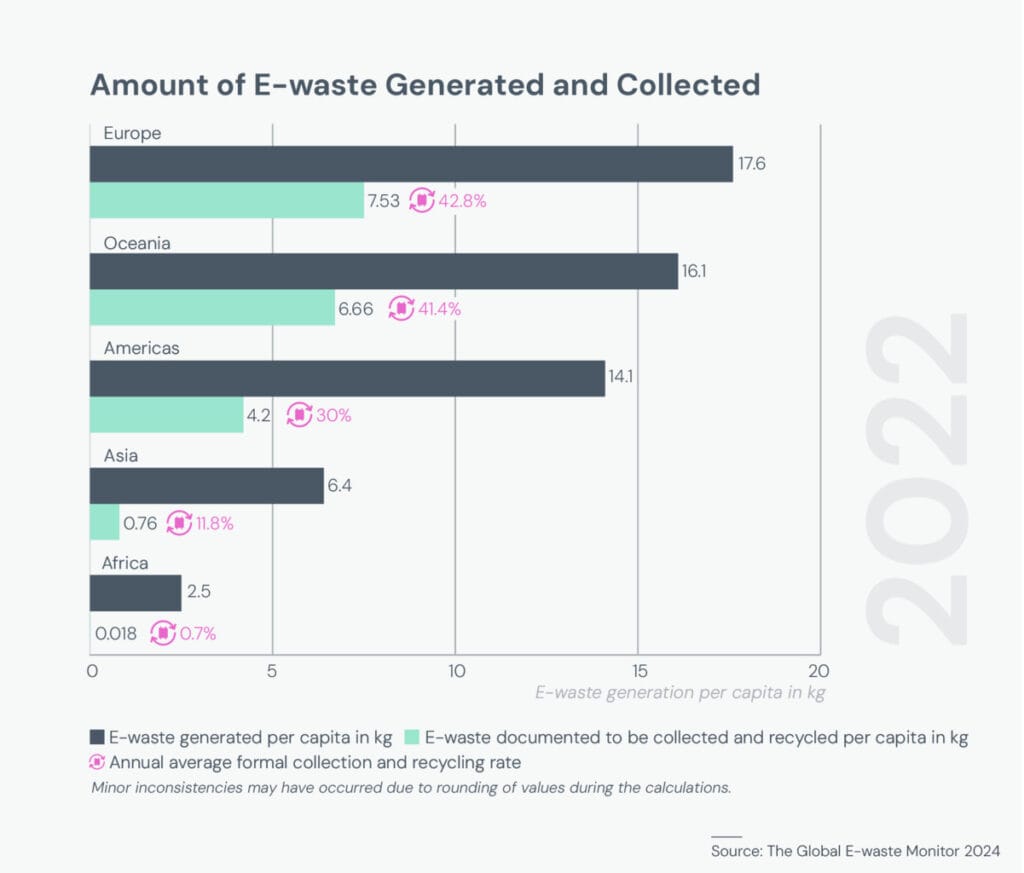
The Problem with E-waste: Challenges in Management and Disposal
The escalating issue of ewaste poses significant hurdles for electronic waste management in the UK. We encounter numerous obstacles in our quest to adopt responsible disposal methods. This pursuit aims to foster a sustainable framework for managing discarded electronic devices.
Inadequate Recycling Infrastructure
The primary barrier in addressing the e-waste crisis is the dearth of adequate recycling facilities. Many regions in the UK face a shortage of infrastructure to handle the rising volume of electronic waste. This scarcity results in a build-up of discarded devices, impeding our capacity to recycle valuable materials effectively.
Illegal Exportation of E-waste
Despite existing regulations, the illicit exportation of e-waste persists as a critical concern. Unscrupulous traders frequently transport electronic waste to developing nations, where it is processed under unsafe conditions. This illicit trade not only jeopardises workers’ health but also exacerbates environmental degradation in these countries.
Lack of Awareness and Proper Disposal Practices
Many UK residents remain uninformed about the appropriate methods for disposing of outdated electronic devices. This lack of knowledge contributes to a substantial portion of e-waste being disposed of in landfills or stored in homes. It is imperative to educate the public on responsible disposal practices to enhance our electronic waste management.
- Approximately 20% of electronic devices are kept in households
- The UK aims to achieve zero e-waste to landfill by 2030
- Enhanced awareness and infrastructure are vital to achieving this objective
Overcoming these challenges is critical for developing a more sustainable e-waste management strategy. By bolstering our recycling infrastructure, enforcing stricter regulations on e-waste exportation, and increasing public awareness, we can strive towards a more responsible and efficient system for managing electronic waste in the UK.
E-waste Regulations and Policies in the UK
The United Kingdom has made substantial strides in addressing the e-waste challenge. We’ve established detailed regulations and policies to encourage sustainable electronics and responsible disposal. This approach aims to mitigate the environmental harm caused by discarded electronics.
The Waste Electrical and Electronic Equipment (WEEE) Directive
The WEEE Directive is a fundamental part of the UK’s e-waste management strategy. It mandates that manufacturers and retailers are accountable for the collection and recycling of electronic products. The directive’s goal is to increase e-waste recycling rates and lessen the environmental footprint of discarded electronics.
Government Targets for E-waste Reduction
The UK government has set ambitious targets for reducing e-waste. These include:
- Achieving an 85% recycling and recovery rate for e-waste
- Offering financial incentives to businesses that engage in responsible e-waste recycling
- Promoting the development of sustainable electronics through research and innovation funding
Local Authority Initiatives for E-waste Collection
Local councils are vital in facilitating e-waste recycling. They offer various services to enhance responsible disposal accessibility for residents:
| Initiative | Description |
|---|---|
| Kerbside Collection | Regular pick-ups of small electronic items alongside normal waste collection |
| Recycling Centres | Designated drop-off points for larger electronic items |
| Community Events | Special e-waste collection days organised in partnership with local businesses |
These initiatives demonstrate the UK’s dedication to overcoming the e-waste challenge. By promoting a culture of responsible disposal and sustainable electronics, we’re striving for a cleaner, greener future.
The Economic Benefits of E-waste Recycling
E-waste recycling brings significant economic advantages. In the UK, this field is creating new jobs and generating income from recycled materials. The increasing need for proper e-waste management is driving the growth of recycling and refurbishment sectors.
The circular economy is key to e-waste recycling. It allows us to reuse materials, reducing the need for extracting raw resources. This saves energy and cuts costs, aligning with sustainability goals and boosting economic productivity.
| Material | Amount Recovered from 1 Million Mobile Phones |
|---|---|
| Copper | 16 tonnes |
| Silver | 350 kilograms |
| Gold | 34 kilograms |
| Palladium | 15 kilograms |
Recycling e-waste offers more than just material recovery. It supports the UK’s green economy, encouraging innovation in recycling technologies and creating skilled jobs. As awareness increases, so does the sector’s economic growth.
Investing in e-waste recycling infrastructure can yield long-term economic benefits. Developing efficient recycling processes allows for the cost-effective extraction of valuable materials. This increases profitability and enhances sustainability.
Sustainable Solutions for E-waste Management
The UK is making substantial strides in addressing the e-waste crisis through sustainable management strategies. We’re witnessing a transition towards a circular economy in electronics. This shift aims to enhance resource efficiency and Lumenloop is proud to be part of the solution.
Promoting the circular economy in electronics
In the circular economy model, electronic products are designed for longevity, repair, and recycling. This approach drastically cuts down on e-waste, promoting sustainable electronics. Many UK businesses are embracing this model, creating products that endure longer and can be upgraded or repaired with ease.
Innovative recycling technologies
E-waste recycling is advancing swiftly with the advent of new technologies. Advanced sorting systems, powered by artificial intelligence, efficiently identify and separate various materials. Hydrometallurgical processes, on the other hand, extract precious metals from circuit boards more effectively than traditional methods.
Extended producer responsibility
The UK is introducing extended producer responsibility schemes. These schemes hold manufacturers accountable for the entire lifecycle of their products, including disposal. This policy nudges companies towards designing more sustainable electronics and investing in e-waste recycling infrastructure.
| Solution | Impact on E-waste | Implementation in UK |
|---|---|---|
| Circular Economy | Reduces waste generation | Growing adoption by tech companies |
| Innovative Recycling | Improves resource recovery | Investments in new facilities |
| Producer Responsibility | Encourages sustainable design | Legal framework in place |
These sustainable solutions are setting the stage for enhanced e-waste management in the UK. By integrating circular economy principles, pioneering recycling technologies, and producer responsibility, we’re forging a path towards a more sustainable electronics future.
Consumer Role in Addressing the E-waste Crisis
As consumers, we have a significant role in addressing the e-waste crisis. Our choices and actions can greatly influence the amount of electronic waste generated and its management. Let’s explore how we can help by contributing to a more sustainable future.
Responsible Consumption Habits
Adopting responsible consumption habits is a good starting point. This involves thinking twice before buying new gadgets and considering if we really need them. Choosing sustainable electronics from eco-friendly manufacturers can significantly impact the environment.
Proper Disposal and Recycling Practices
Proper disposal is essential for managing e-waste effectively. Instead of throwing old devices in the bin, we should seek out proper e-waste recycling facilities. Many retailers and local councils offer collection points for electronic waste. By using these services, we ensure our old gadgets are recycled correctly.
Supporting Eco-Friendly Electronics Manufacturers
We can drive change by supporting companies that prioritise sustainability. Look for manufacturers who use recyclable materials or issue EPDs, design products for longevity, and offer repair services. Our purchasing power can encourage more businesses to adopt eco-friendly practices.
| Consumer Action | Impact on E-waste |
|---|---|
| Buy refurbished devices | Reduces demand for new electronics |
| Repair instead of replace | Extends device lifespan |
| Use e-waste recycling services | Ensures proper disposal and resource recovery |
| Choose sustainable brands | Encourages eco-friendly manufacturing |
By embracing these practices, we can each contribute to reducing e-waste and promoting a more sustainable approach to our use of technology. Remember, every small action counts in the fight against electronic waste.
Closing the Loop
The issue of ewaste is escalating, requiring our urgent attention. Electronic waste management is a complex challenge for the UK and globally. The vast amounts of discarded devices, along with their harmful components, threaten our environment and health.
Fortunately, sustainable solutions are available. By adopting cutting-edge recycling technologies and fostering a circular economy in electronics, we can transform this problem into a chance. Enhancing infrastructure, enforcing stricter regulations, and raising consumer awareness are essential steps towards managing electronic waste effectively.
Our collective action is vital in addressing this problem. From government initiatives to personal actions, every effort matters. By choosing wisely, supporting green manufacturers, and disposing of outdated gadgets responsibly, we can all help reduce ewaste. Through unity, we can forge a sustainable digital future.
FAQ
What is considered electronic waste?
Electronic waste, or e-waste, includes discarded electrical and electronic devices. This includes items like computers, mobile phones, household appliances, and medical equipment.
How much e-waste does the UK generate annually?
The UK produces over 1.6 million tonnes of e-waste each year. This makes it one of the fastest-growing waste streams in the country.
What are the hazardous substances found in e-waste?
E-waste contains up to 1000 different chemical substances. These include known neurotoxicants like lead. If not disposed of or recycled properly, these can contaminate soil, water, and air.
How does improper e-waste disposal and recycling affect human health?
Improper disposal and recycling of e-waste pose significant health risks. This is most concerning for children and pregnant women. Exposure to e-waste has been linked to adverse neonatal outcomes, neurodevelopmental issues, and reduced lung function.
What challenges does the UK face in managing e-waste?
The UK faces several challenges in managing e-waste. These include inadequate recycling infrastructure, illegal exportation of e-waste, and a lack of awareness and proper disposal practices.
What is the WEEE Directive, and what are its aims?
The Waste Electrical and Electronic Equipment (WEEE) Directive aims to ensure that 85% of e-waste is recycled and recovered within the UK.
How can e-waste recycling benefit the economy?
E-waste recycling offers significant economic benefits. Valuable materials like copper, silver, gold, and palladium can be recovered from discarded electronic devices.
What are some sustainable solutions for e-waste management?
Sustainable solutions for e-waste management include promoting the circular economy in electronics. It also involves developing innovative recycling technologies and implementing extended producer responsibility.
How can consumers contribute to addressing the e-waste crisis?
Consumers have a vital role in addressing the e-waste crisis. They can contribute through responsible consumption habits, proper disposal and recycling practices. Supporting eco-friendly electronics manufacturers is also important.
